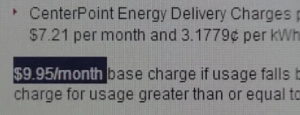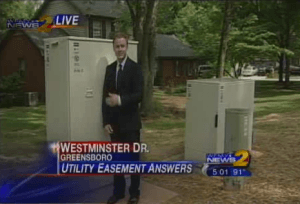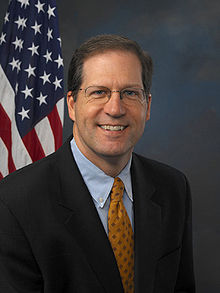 The telecommunications industry better not take a tip from some Texas power companies that have found new ways to increase profits: charging customers a penalty when they do not use enough electricity during the month. Imagine if broadband providers with Internet Overcharging schemes followed suit.
The telecommunications industry better not take a tip from some Texas power companies that have found new ways to increase profits: charging customers a penalty when they do not use enough electricity during the month. Imagine if broadband providers with Internet Overcharging schemes followed suit.
After Texas deregulated electric utilities, an increasing number of companies are using their freedom to find new, creative ways to tack on additional fees and surcharges that might normally be considered the cost of doing business.
CenterPoint Energy, a Fortune 500 corporation providing service in Arkansas, Louisiana, Minnesota, Mississippi, Oklahoma, and Texas would like to introduce you to its Minimum Usage Penalty — a $9.95 fee applied to Texans caught using too little electricity from the company.
While most utility companies set a basic customer charge applicable to everyone, which covers the cost of your electric meter, power lines and their upkeep, billing, and other administrative expenses, many Texas power companies are billing consumers a monthly fee for conserving too much electricity.
The concept flies in the face of common sense, especially as the state contends with dozens of 100+ degree summer days and pleas from utilities for customers to cut back on energy use. But if some do, especially low-consumption customers in apartments or those who maintain part-time residences, they’ll pay a penalty for doing so.
The Texas Electricity Ratings Blog found more than a dozen power companies with similar policies, with penalties as high as $12.96 for using less than 1,000 kWh per month:
Ambit Energy: $9.99 for less than 1000 kWh per month
Amigo Energy: Depending on the plan it is $9.95 of $6.95 for less than 1000 kWh per month
Bounce Energy: $4.95 for less than 1000 kWh per month for almost all of their plans, except intro plans are $6.96 per month for less than 1000 kWh.
Champion Energy: $4.95 for less than 500 kWh per month
Cirro Energy: $5.25 for less than 1000 kWh per month
Direct Energy: I couldn’t find a Monthly Fee in their Terms of Service or EFLs
Dynowatt: $6.95 for less than 1000 kWh per month
First Choice Power: $5 for less than 650 kWh per month, plus a $4.95 base charge
GEXA Energy: Seems to simply use a sliding rate per plan for different usage w/o a minimum charge
Green Mountain Energy: Didn’t seem to see any minimum usage charge in the EFL or Terms of Service
Mega Energy: $12.96 for less than 1000 kWh per month
MX Energy: Seems to simply use a sliding rate per plan for different usage w/o minimum charge
Reliant Energy: $9.95 for less than 800 kWh per month
Southwest Power & Light: I didn’t see minimum usage but they had a $7.95 monthly meter fee.
Spark Energy: $8.99 for less than 1000 kWh per month
StarTex Power: $4.99 for less than 500 kWh per month
Tara Energy: $6.95 for less than 500 kWh per month
Texas Power: $10.00 for less than 1000 kWh per month
TXU Energy: TXU uses a base $4.95 charge and sliding rates for less or greater than 1000 kWh, per plan.
[flv width=”600″ height=”358″]http://www.phillipdampier.com/video/KTRK Houston Higher Bills for Not Using Enough 7-11.flv[/flv]
KTRK in Houston provides surprising information about Texas utility usage-based-billing rates — power companies will charge you a penalty for not consuming enough electricity. Better hope broadband providers angling for UBB don’t catch on. (3 minutes)


 Subscribe
Subscribe







